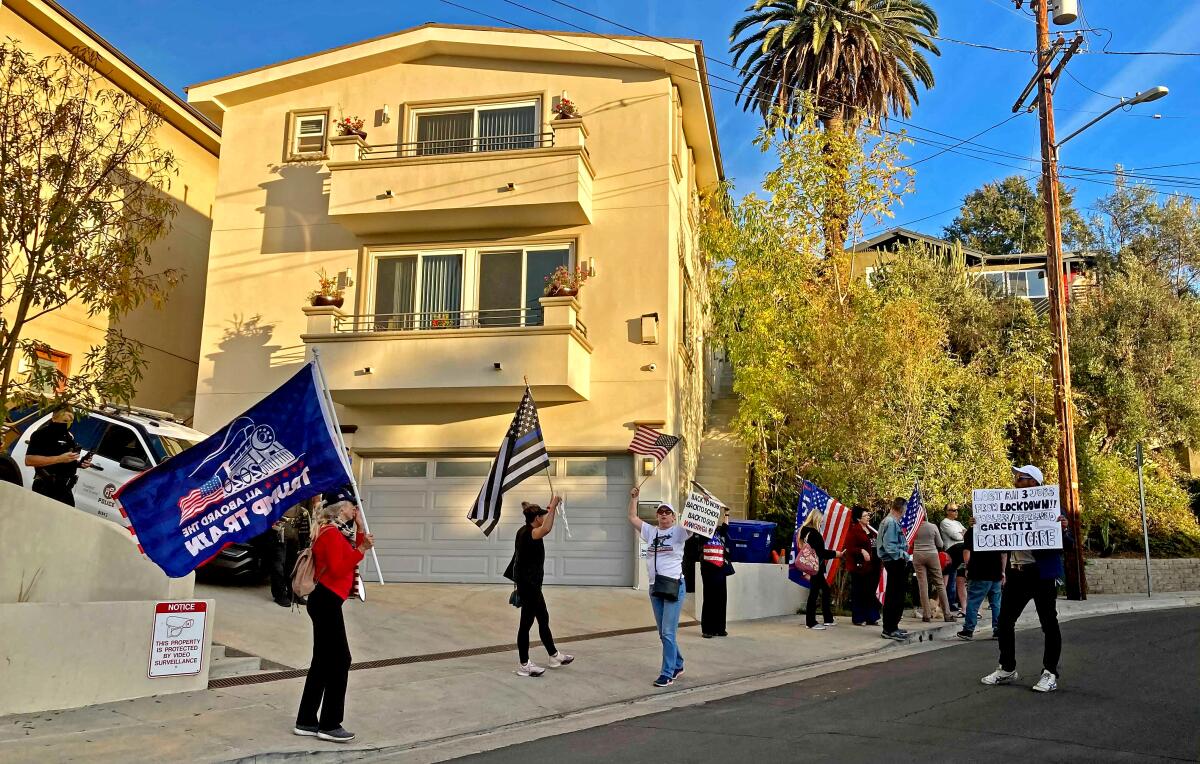California lawmakers want to crack down on public meeting disruptions

- Share via
SACRAMENTO — California school boards, city councils and boards of supervisors would have clearer authority to remove disruptive participants from their meetings under a bill introduced Thursday in the Legislature that aims to protect local officials from harassment and verbal abuse.
Senate Bill 1100 would modify the Brown Act, a 1953 state law that requires an opportunity for public input during meetings to increase accessibility and transparency in local government. The law already lets those serving on legislative bodies remove people for “willfully interrupting” proceedings, but state Sen. Dave Cortese (D-San Jose) said it should be updated to include a more precise definition of that behavior. Assembly Member Evan Low (D-Campbell) also signed on to the bill as a principal co-author.
The bill would clarify “willfully interrupting” to mean “intentionally engaging in behavior during a meeting of a legislative body that substantially impairs or renders infeasible the orderly conduct of the meeting.” The bill would also require officials to issue a warning to participants to “curtail their disruptive behavior” before removing them or clearing a room.
Cortese said he decided to write the bill in response to verbal attacks last year against Marico Sayoc, then-mayor of Los Gatos. Protesters used anti-LGBTQ and anti-vaccine rhetoric during meetings, made personal comments about Sayoc’s son and then demonstrated outside her home.
“She came under very aggressive attacks over not only policy issues there, but they became very much ad hominem attacks against her and her family ... over issues that really weren’t in play before the town council,” Cortese said.
Similar situations have occurred across California during the COVID-19 pandemic, in meetings of local governments and legislative bodies, as officials rendered decisions on mask policies and vaccine requirements for schools, businesses and restaurants.
Placentia-Yorba Linda Unified School District board members have ended meetings minutes after they began because attendees have refused to wear masks. Protesters showed up at an El Dorado County principal’s home last month in opposition to mandated face coverings for children. An August San Diego Board of Supervisors meeting made national headlines after speakers railed against COVID-19 mitigation measures and discussed conspiracy theories.
Participants have also used local meetings to lambaste public health officials and oppose critical race theory, an academic framework that reviews systemic racism in the United States.
California School Boards Assn. Chief Executive Vernon M. Billy asked Gov. Gavin Newsom in a September letter to help address “dangerous and outrageous conduct committed against school trustees during their board meetings.”
“I’ve watched in horror as school board members have been accosted, verbally abused, physically assaulted, and subjected to death threats against themselves and their family members,” Billy wrote.
The debates have centered on increasingly partisan and political issues, deepening divisions between Democrats and Republicans. Cortese said SB 1100 wouldn’t prevent public meeting participants from expressing their views, “whether we agree with them or not.”
Assembly Member Heath Flora (R-Ripon) said it was important to protect freedom of speech “while ensuring respectful dialogue,” but he and other Republicans did not raise immediate concerns with the bill.
“As long as there are safeguards in this bill to make sure it isn’t abused by local officials to silence the public, then this sounds reasonable to me,” Flora said in a statement.
Cortese said he carefully crafted SB 1100 to pass constitutional muster with regard to the 1st Amendment but acknowledged the bill might need to be amended as it moves through committee hearings.
“We are going to do the best we can to thread the needle on verbal abuse without trampling rights,” he said. “I am pretty confident we will be able to come up with suitable language that will strengthen public safety protections within these meetings without crossing any lines ourselves in terms of the public’s right to petition their government and say things they want to say.”
More to Read
Sign up for Essential California
The most important California stories and recommendations in your inbox every morning.
You may occasionally receive promotional content from the Los Angeles Times.











